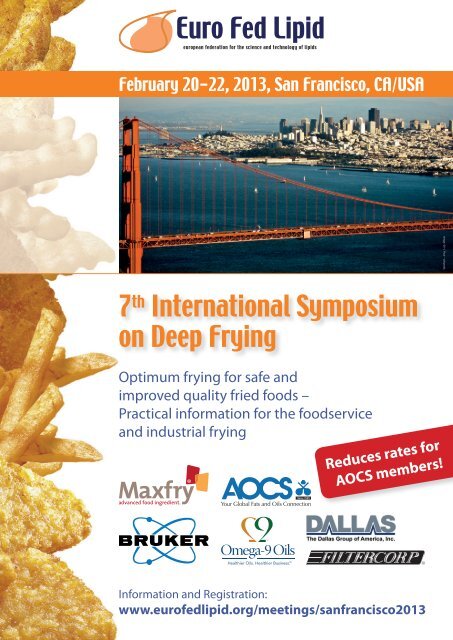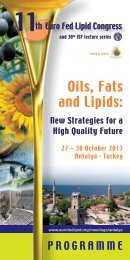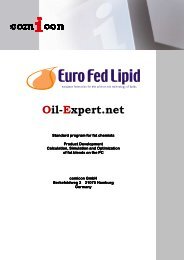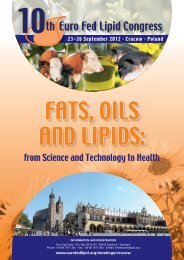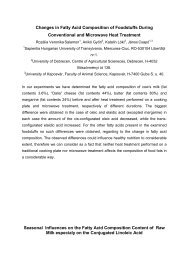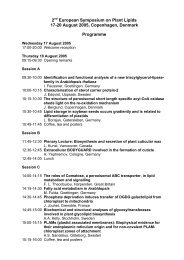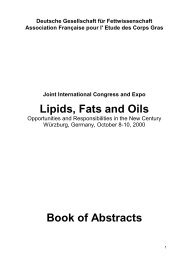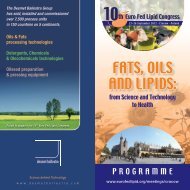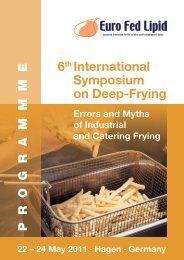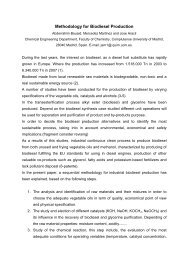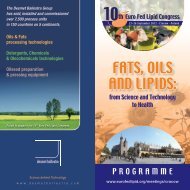Download the Program Brochure (.pdf, 4 MB) - Euro Fed Lipid
Download the Program Brochure (.pdf, 4 MB) - Euro Fed Lipid
Download the Program Brochure (.pdf, 4 MB) - Euro Fed Lipid
You also want an ePaper? Increase the reach of your titles
YUMPU automatically turns print PDFs into web optimized ePapers that Google loves.
February 20-22, 2013, San Francisco, CA/USA<br />
7 th International Symposium<br />
on Deep Frying<br />
Optimum frying for safe and<br />
improved quality fried foods –<br />
Practical information for <strong>the</strong> foodservice<br />
and industrial frying<br />
Reduces rates for<br />
AOCS members!<br />
Information and Registration:<br />
www.eurofedlipid.org/meetings/sanfrancisco2013<br />
Image: © H. Paul – wikipedia
Dear Readers,<br />
Since 1973, <strong>the</strong> international symposia on deep-fat frying organized through <strong>the</strong> DGF and <strong>Euro</strong> <strong>Fed</strong> <strong>Lipid</strong><br />
have been <strong>the</strong> premier meetings on this misunderstood and underappreciated topic. The frying process is<br />
a very popular, efficient and ancient method to prepare foods that have desirable color, appearance, flavor<br />
and texture. The bottom line is that fried foods taste good, hence <strong>the</strong>ir popularity. 5,000 year old Chinese<br />
texts reference <strong>the</strong> process.<br />
However, frying is done in oil and <strong>the</strong> foods that are fried pick up some of that oil, which has resulted in<br />
issues with <strong>the</strong> health and wellness set.<br />
The frying process is one of <strong>the</strong> most dynamic of all food processes. If one was to classify it as a process,<br />
it would be a combination of drying and cooking. Fried foods lose moisture as <strong>the</strong>y cook and depending<br />
upon <strong>the</strong> food being fried, <strong>the</strong> end product may be moist with a delicious crust (chicken or fish) or dry and<br />
crunchy (crisps or chips). Understanding this process and maintaining <strong>the</strong> quality of <strong>the</strong> oil is essential to<br />
high quality foods. Bad oil equals bad food which causes your customers to go elsewhere.<br />
There are a wide variety of analytical methods, both rapid and official, have been developed to test <strong>the</strong><br />
chemical and physical properties of heated and abused oils. Hundreds of different compounds have been<br />
detected in frying oils and in <strong>the</strong> food itself, some of which are deemed to be unhealthy. The previous six<br />
symposia on deep frying have focused on subjects such as determining <strong>the</strong> proper chemical indices for<br />
evaluating <strong>the</strong> degree of fat degradation, understanding <strong>the</strong> frying process from an engineering standpoint<br />
and new methods and technologies aimed at improving <strong>the</strong> overall process. The end result of <strong>the</strong>se<br />
symposia have been <strong>the</strong> establishment regulations to govern food service and restaurant frying; <strong>the</strong>y have<br />
established guidelines for improving <strong>the</strong> frying process; and provided oil chemists with analytical tools to<br />
better understand how food fries.<br />
The thrust of <strong>the</strong> most recent symposia in San Francisco in 2005 and Hagen, Germany in 2011 have been<br />
to help processors, food service operators, regulators, suppliers and academics better understand <strong>the</strong><br />
frying process in light of <strong>the</strong> worldwide emphasis on health and wellness and concerns about <strong>the</strong> effects<br />
on obesity on people and <strong>the</strong> social systems. Ra<strong>the</strong>r than condemning frying upright, <strong>the</strong> key has been<br />
to improve efficiencies, better understand how <strong>the</strong> new generation of healthy oils (low- and no trans) oils<br />
perform, and even look to <strong>the</strong> past for lessons on how to do things better.<br />
The technical program of <strong>the</strong> 7th International Symposium on Deep-Fat Frying looks to address issues<br />
such as old and new technologies and products for process improvement, diet and health, <strong>the</strong> regulatory<br />
environment where fats, oils and frying is concerned, and methodologies to better evaluate <strong>the</strong> oils used<br />
for frying and <strong>the</strong> foods being fried.<br />
Food processors and restaurant operators that fry foods and <strong>the</strong> suppliers to <strong>the</strong>se industries, which<br />
includes oil producers, food and ingredient suppliers, equipment manufacturers and <strong>the</strong> service trade<br />
understand that to remain in business <strong>the</strong>y must not only produce foods that are safe and wholesome, but<br />
taste good and are good for you. The pressures on <strong>the</strong> industry are great, but understanding <strong>the</strong> process<br />
and technologies, <strong>the</strong> markets and <strong>the</strong> demands of <strong>the</strong> business can help build <strong>the</strong> bottom line. Our goal<br />
is to provide you with <strong>the</strong> knowledge to improve and move forward in <strong>the</strong> future.<br />
We look forward to welcoming you in San Francisco in February 2013.<br />
Richard F. Stier<br />
Sonoma, CA/USA<br />
InvItatIon<br />
Christian Gertz<br />
Hagen, Germany<br />
1
2<br />
golD SponSoRS<br />
SponSoRS, SponSoRIng, ExhIbItIon<br />
bruker optics Contact: Dagmar Behmer<br />
dagmar.behmer@brukeroptics.de<br />
Dallas group Contact: Brian S. Cooke<br />
bcooke@dallasgrp.com<br />
Bruker Optik GmbH, Rudolf-Plank-Str.27, 76275 Ettlingen,<br />
Germany<br />
1402 Fabricon Bld.<br />
Jeffersonville, IN 47130, USA<br />
Phone: +1/812/283/6675 ext. 2229<br />
Fax: +1/812/285/7560<br />
Dow agroSciences, omega-9 oils Contact: Dave Van Dam<br />
davandam@dow.com<br />
Dow AgroSciences, 2100 - 450 1st St SW Calgary, AB Canada<br />
T2P 5H1<br />
Phone: +1/403/735 8902<br />
Filtercorp Contact: Robin D. Bernard, President<br />
rbernard@filtercorp.com<br />
Maxfry gmbh Contact: Sven Seifer<br />
sven.seifer@maxfry.de<br />
9805 NE 116th St., P<strong>MB</strong> A200, Kirkland WA 98034, USA<br />
Tel: +1/425/820 4850,<br />
Mobile: +1 425 864 7375<br />
Fax: +1/425/820 2816<br />
Grabenstraße 3, 58095 Hagen, Germany<br />
Phone: +49/2331/39 69 71 0<br />
Fax +49/2331/39 69 71 2<br />
The organizers offer three different packages to make your company visible in <strong>the</strong> framework of <strong>the</strong> congress.<br />
For o<strong>the</strong>r requirements please contact amoneit@eurofedlipid.org
SponSoRIng, pRogRaM<br />
benefit package 1<br />
(gold)<br />
package 2<br />
(Silver)<br />
package 3<br />
(bronze)<br />
Complimentary congress registrations Two One ---<br />
Additional representatives of <strong>the</strong> sponsor 25% discount<br />
for two persons<br />
Company logo/link in all publications and on <strong>the</strong><br />
congress webpage<br />
Leaflet or information brochure in all congress<br />
bags. Insert to be produced by <strong>the</strong> sponsor.<br />
Announcement of <strong>the</strong> sponsor during <strong>the</strong> official<br />
opening of <strong>the</strong> conference<br />
Advertisement during breaks (presentation or<br />
video)<br />
Yes (cover<br />
placement)<br />
25% discount<br />
for one person<br />
---<br />
Yes Yes<br />
Yes Yes Yes<br />
Yes Yes ---<br />
Yes Yes ---<br />
Advertisement banner in <strong>the</strong> poster exhibition Yes --- ---<br />
Participation in <strong>the</strong> table top exhibition Yes Yes Yes<br />
Package cost (Subject to VAT for German companies.<br />
EU based companies please advise your<br />
VAT number). No tax for US based companies.<br />
2500 US$ 1500 US$ 500 US$<br />
to confirm your package please contact <strong>the</strong> headquarters<br />
<strong>Euro</strong> <strong>Fed</strong> <strong>Lipid</strong><br />
Varrentrappstr. 40-42<br />
60486 Frankfurt, Germany<br />
Phone: +49 69 7917 345<br />
Fax +49 69 7917 564<br />
amoneit@eurofedlipid.org<br />
Wednesday, February 20, 2013<br />
06:00 PM opening Mixer golden gate Room<br />
posters and table top Exhibition<br />
REgIStRatIon<br />
08:45 WElcoME<br />
1st Session health and Wellness<br />
thursday, February 21, 2013<br />
09:00 health, Wellness & Frying: pros and cons<br />
A. Elizabeth Sloan, Sloan Trends & Solutions, Escondico, California, USA<br />
09:45 health Risks from oxidized oils and <strong>the</strong>ir heat Decomposition products<br />
(Diabetes Mellitus, cardiovascular Disease, a<strong>the</strong>riosclerosis)<br />
Veronika Somoza, Institute of Nutrional and Physiological Chemistry,<br />
University of Vienna, Austria<br />
10:30 Ensuring <strong>the</strong> health and Safety of Fried Foods<br />
Richard Stier, Sonoma, California, USA<br />
11:00 COFFEE BREAK, POSTERS, TABLE TOP ExHIBITION<br />
3
4<br />
pRogRaM<br />
thursday, February 21, 2013<br />
2nd Session Frying oil contaminants and toxicological Relevant compounds<br />
11:30 acrylamide in Foods: a Review of <strong>the</strong> Science and Future considerations<br />
James R. Coughlin, Coughlin & Associates, Aliso Viejo, California, USA<br />
12:00 acrylamide-Formation and activities in <strong>Euro</strong>pe concerning<br />
acrylamide Reduction<br />
Bertrand Matthäus, Max Rubner-Institute, <strong>Fed</strong>eral Research Centre for Nutrition and<br />
Food, Detmold, Germany<br />
12:30 a better Understanding of oil Degradation during Frying process<br />
Roman Przybylski, University of Lethlbridge, Alberta, Canada<br />
01:00 PM LUNCH, POSTERS, TABLE TOP ExHIBITION<br />
3rd Session Quality Frying and Monitoring <strong>the</strong> Frying process<br />
02:00 alternatives to hard Fats: low and no-trans oils in Frying<br />
Monoj Gupta, MG Edible Oil Consulting, Richardson,Texas, USA<br />
02:30 are high oleic oils a good alternative to common Used Frying Media?<br />
Bertrand Matthäus, Max Rubner-Institute, <strong>Fed</strong>eral Research Centre for Nutrition and<br />
Food, Detmold, Germany<br />
03:30 natural and Syn<strong>the</strong>tic Stabilizing agents for Frying oils<br />
(Efficacy, and Their Mechanism of Action)<br />
Christian Gertz, Hagen, Germany<br />
03:30 COFFEE BREAK, POSTERS, TABLE TOP ExHIBITION<br />
04:00 criteria for Selection of Frying oils: Specifications, Frying Studies and<br />
Working with Your vendors<br />
Bertrand Matthäus, Max Rubner-Institute, <strong>Fed</strong>eral Research Centre for Nutrition and<br />
Food, Detmold, Germany<br />
04:30 Evalutation of Simple tests for Monitoring Frying operations<br />
(Quick tests, nIR, chemical and physical analytical tests)<br />
Christian Gertz, Hagen, Germany<br />
05:00-06:00 presentations by Sponsors:<br />
Quality assessment by nIR, Dagmar Behmer, Bruker Optics<br />
title to be announced, Robin Bernard, Filtercorp<br />
optimizing <strong>the</strong> Frying and baking process using oil Improving agents,<br />
Sven Seifer, Maxfry<br />
Eliminating Frying oil Discard by controlling Degradation compounds,<br />
Brian Cooke, The Dallas Group<br />
title to be announced, David Dzisiak, Dow Agrosciences<br />
07:00 DINNER
4th Session Industrial Frying operations<br />
Friday, February 22, 2013<br />
09:00 overview of Industrial Frying Systems and criteria for Selection of Industrial<br />
Fryers<br />
James Padilla, Heat & Control, Hayward, California, USA<br />
09:30 haccp in Industrial Frying operations<br />
Christian Gertz, Hagen, Germany<br />
10:00 Filter Systems for Industrial Frying operations: overview and Differentiation of<br />
active and passiv Systems<br />
Monoj Gupta, MG Edible Oil Consulting, Richardson,Texas, USA<br />
10:30 COFFEE BREAK, POSTERS, TABLE TOP<br />
5th Session Foodservice Frying operation<br />
11:00 overview of Foodservice Fryer types and criteria for Selection Worldwide<br />
Linda Brugler and Scott Baillargeon, Frymaster, USA<br />
11:30 troubleshooting problems in Deep-Fat Frying: Industrial and Foodservice<br />
Monoj Gupta, MG Edible Oil Consulting, Richardson, Texas, USA<br />
12:00 Infl uence of Ingredients on Reducing oil absorption During Immersion Frying of<br />
battered and breaded Foods<br />
Robert Brannan, Ohio University, A<strong>the</strong>ns, Georgia, USA<br />
12:30 LUNCH, POSTERS, TABLE TOP ExHIBITION<br />
6th Session Regulation of Frying Fats<br />
pRogRaM<br />
01:30 PM overview of Regulatory Issues Worldwide<br />
Richard Stier, Sonoma, California, USA<br />
02:00 how to harmonize Quality criteria for Foodservice and Restaurant Frying?<br />
Christian Gertz, Offi cial Institute of Chemical Analysis, Hagen, Germany<br />
02:30-04:00 Final Discussion and Defi nition of Resolutions<br />
poStER<br />
The scientifi c committee has started to accept abstracts for scientifi c<br />
poster presentations.<br />
To submit your contribution please follow <strong>the</strong> two steps below:<br />
1 To prepare a one page abstract, please use <strong>the</strong> model available at<br />
<strong>the</strong> congress webpage and store your abstract as rich text format<br />
(.rtf) on your computer (no .<strong>pdf</strong> please!)<br />
2 Mail <strong>the</strong> abstract to saritas@eurofedlipid.org and indicate that it is<br />
a poster for <strong>the</strong> 7th Symposium on Deep-Frying<br />
5
6<br />
Dr. A.Elizabeth Sloan<br />
lEctURERS<br />
Sloan Trends, Inc., a 17-year old consulting company, with focus on new market<br />
predictions, trend-tracking and business building ideas for <strong>the</strong> food, beverage and<br />
restaurant industries. Dr. Sloan is also <strong>the</strong> trends columnist for Food Technology<br />
magazine.<br />
She was Editor-in-Chief, at McCall’s magazine; Director of <strong>the</strong> Good Housekeeping<br />
Institute/Seal, and Assistant Editor-in-Chief of Good Housekeeping magazine<br />
– each with 35+ million readers monthly. Dr. Sloan was SVP/International Director,<br />
Food & Nutrition, Hill & Knowlton Public Relations; 1st Scientific Director, Am. Assoc.<br />
of Cereal Chemists & Director of Nutrition Communications/Technical Services,<br />
General Mills.<br />
She has authored more than 400 articles on food, nutrition, and health marketing,<br />
and received her B.S. in Food Science at Rutgers University; and her Ph.D. in Food<br />
Science, at <strong>the</strong> University of Minnesota.<br />
Prof. Dr. Veronika Somoza<br />
Institute of Nutritional and Physiological Chemistry, University of Vienna, Austria<br />
Born 25 Sptember 1965, Braunschweig, Germany<br />
Current Position: Professor and Chair, Institute of Nutritional and Physiological<br />
Chemistry, University of Vienna, Austria<br />
Education and Career History:<br />
1985-1991: Study of Human Nutrition, University of Giessen, Germany<br />
1991-1995: Ph.D. program, Institute of Human Nutrition, University of Vienna,<br />
Austria (grade: summa cum laude)<br />
1995-2002: Habilitation program, University of Kiel, Germany<br />
2001: Post-doc with Prof. Dr. John W. Baynes, at <strong>the</strong> Dpt. of Biochemistry<br />
and Chemistry, University of South Carolina, USA<br />
2002: Habilitation (venia legendi) in “Human Nutrition and Food Science”,<br />
University of Kiel, Germany<br />
2003: Vice Chair of <strong>the</strong> German Research Center for Food Chemistry,<br />
Garching, Germany<br />
2003: venia docendi for <strong>the</strong> topic “Food Science” at <strong>the</strong> Technical University<br />
of Munich, Germany<br />
2007-2009: Associate Professor (tenured) at <strong>the</strong> Department of Food Science,<br />
University of Wisconsin / Madison, USA 2008-2009: Chair of <strong>the</strong><br />
working group “Bioactive Foods” at <strong>the</strong> German Research Center<br />
for Food Chemistry, Garching, Germany<br />
since 09/2009: Member of <strong>the</strong> Food Research Institute, Madison/WI, USA<br />
2009-2011: Chair of <strong>the</strong> Research Platform Molecular Food Science, University<br />
of Vienna, Austria<br />
since 2011: Chair of <strong>the</strong> Institute of Nutritional and Physiological Chemistry,<br />
University of Vienna, Austria<br />
Publications: about 85 (co)-authored research publications and review articles<br />
Review activities: Multiple journals with a focus on functional food constituents:<br />
e.g. J. Agr. Food Chem., Mol. Nutr. Food Res, Chem. Res. Tox., Food Chem Tox,<br />
etc.; Senior editor of <strong>the</strong> Journal Molecular Nutrition and Food Research<br />
Memberships: German Society of Nutrition, German Chemical Society, American<br />
Chemical Society<br />
Research interests: Bioactivity and metabolism of fatty acids, polyphenols and<br />
Maillard reaction products
lEctURERS<br />
Richard F. Stier<br />
Consulting Food Scientists, Sonoma, CA/USA<br />
Richard Stier is a consulting food scientist with international experience in food<br />
safety (HACCP), food plant sanitation, quality systems, process optimization, GMP<br />
compliance, and food microbiology. He has worked with a wide range of processing<br />
systems and products, including canning, freezing, dehydration, deep-fat frying,<br />
aseptic systems, meat processing and processing. He has shown a unique ability to<br />
work with companies at all levels, from top management, including marketing, to line<br />
workers, to understand, develop and implement systems to enhance operations.<br />
Stier has been instrumental in helping processors, including many small processors<br />
develop <strong>the</strong> quality, food safety and sanitation systems needed to compete in<br />
today’s market and grow <strong>the</strong>ir business. He is also a food safety, GMP, and quality<br />
systems auditor. Stier has worked in Asia, Africa, Australia, Central and South America,<br />
and <strong>Euro</strong>pe. All totalled, he has done projects in over forty countries<br />
Stier has been certified as a seafood HACCP instructor (AFDO) and by <strong>the</strong> HACCP<br />
Alliance.<br />
Stier has a B.S. in Food Science from Rutgers University and an M.S. in Food Science<br />
and Technology from <strong>the</strong> University of California at Davis. He is a member of<br />
<strong>the</strong> IFT, IAFP, and <strong>the</strong> NCAACC. He is past Chairman of <strong>the</strong> Nor<strong>the</strong>rn California Section<br />
of <strong>the</strong> IFT and of <strong>the</strong> Nor<strong>the</strong>rn California Section of <strong>the</strong> AACC, a past-Chairman<br />
of IFT’s Refrigerated and Frozen Foods Executive Committee, is a former member<br />
of <strong>the</strong> IFT <strong>Program</strong> Committee, a past-Chair of IFT’s Continuing Education Committee<br />
and former councilor representative to <strong>the</strong> IFT’s Executive Committee. He is<br />
a Contributing Editor to “Baking & Snack”, “Food Engineering”, and serves on <strong>the</strong><br />
editorial board of Food Safety Magazine. He has served on <strong>the</strong> IFT’s ad hoc panel<br />
assembled to comment on proposed food safety regulations and is a member of <strong>the</strong><br />
United States delegation for TC-34, <strong>the</strong> technical committee charged with developing<br />
<strong>the</strong> ISO 22000 standard.<br />
Dr. James R. Coughlin<br />
Academic Bacground:<br />
– Bachelor’s Degree, Chemistry, Siena College, Loudonville, New York.<br />
– Master’s Degree, Food Science and Technology, University of California, Davis.<br />
– Ph.D., Agricultural and Environmental Chemistry, University of California, Davis.<br />
– Postdoctoral Fellowship, Environmental Toxicology, University of California, Davis.<br />
Industrial/Professional Experience:<br />
Dr. Coughlin has 40 years of experience in food/nutrition science and regulatory affairs;<br />
food, chemical and environmental toxicology and safety; chemical risk assessment;<br />
diet and cancer evaluations, especially coffee and meats; benefit-risk evaluation<br />
of foods and food ingredients; GRAS food additive safety evaluations; safety<br />
and benefits of functional foods; California Proposition 65; health effects of caffeine,<br />
dietary nitrite/nitrate, Maillard carcinogens such as acrylamide and furan; safety<br />
of imported food ingredients and biotechnology-derived foods; food and environmental<br />
chemical analyses; naturally occurring food toxicants; antioxidants in foods<br />
and supplements; and scientific risk communication.<br />
He provides strategic scientific, toxicologic, nutritional, communications and regulatory<br />
counsel to many food, functional food, dietary supplement, chemical, and<br />
consumer products companies and <strong>the</strong>ir trade associations, law firms and public<br />
relations firms.<br />
7
8<br />
Dr. Bertrand Matthäus<br />
lEctURERS<br />
Food Chemist, Scientist at <strong>the</strong> Max Rubner-Institute, <strong>Fed</strong>eral Research Institute for<br />
Nutrition and Food, Detmold, Germany<br />
In this position he is responsible for research dealing with <strong>the</strong> improvement of<br />
<strong>the</strong> quality of fats and oils, especially rapeseed oil, with <strong>the</strong> investigation of frying<br />
processes, with contaminants like acrylamide, phthalates or 4-hydroxy-2-trans-<br />
nonenal, 3-MCPD-esters and with <strong>the</strong> investigation of oxidation processes in edible<br />
fats and oils. He is a member of <strong>the</strong> MRI-Rapeseed oil panel evaluating <strong>the</strong> sensory<br />
quality of rapeseed oil.<br />
Since <strong>the</strong> last 19 years he has worked for <strong>the</strong> Max Rubner-Institute. He has published<br />
more than 160 articles, scientific papers and c hapters of books. In several projects<br />
he worked toge<strong>the</strong>r with <strong>the</strong> industry to evaluate and improve <strong>the</strong> quality of frying<br />
oils but also virgin rapeseed oil. He has presented lectures during <strong>the</strong> last three<br />
International Symposiums on Deep-Fat Frying held in Germany and USA and is coorganizer<br />
of several symposiums on Fats and Oils given for <strong>the</strong> industry. Matthäus<br />
is a member of <strong>the</strong> <strong>Euro</strong> <strong>Fed</strong> <strong>Lipid</strong> association and <strong>the</strong> German Society for Fat<br />
Science.<br />
Monoj Gupta<br />
MG Edible oil Consulting International, Inc., Richardson, TX/USA<br />
Monoj K. Gupta is <strong>the</strong> president and founder of MG Edible oil Consulting International,<br />
Inc. which he founded in 1998. He has been in <strong>the</strong> field of oil technology and<br />
food processing for over thirty-nine years, and holds a Master’s degree in Chemical<br />
Engineering from <strong>the</strong> University of Florida, Gainsville, Florida.<br />
As President of MG Edible Oil, he is currently providing consulting services to Oil<br />
and Food Processing companies in <strong>the</strong> United States, Latin America, Africa, <strong>Euro</strong>pe<br />
and <strong>the</strong> Middle East. Prior to founding MG Edible Consulting, Mr. Gupta worked at<br />
Frito-Lay, Inc., for eleven years where he advised <strong>the</strong> company on oil application for<br />
<strong>the</strong> worldwide operation of Pepsi CO<br />
Mr. Gupta began his career working for Procter & Gamble (P & G). His assignments<br />
included working in P & G’s Food Research and Development department where he<br />
was subsequently promoted as a Group Leader in <strong>the</strong> area of dry prepared mixes<br />
(Duncan Hines). Later he worked as <strong>the</strong> Department Manager of <strong>the</strong> Shortening and<br />
Oil Production department, which produced nearly 300 million pounds of shortening<br />
and oil products. Later he joined <strong>the</strong> Anderson Clayton, Inc. a Houston based<br />
multi-national company, where he was responsible for productivity improvement and<br />
engineering in several plants in <strong>the</strong> U.S. and in Mexico.<br />
Mr. Gupta is also <strong>the</strong> author of numerous technical publications in <strong>the</strong> U.S. and in<br />
o<strong>the</strong>r countries. He has written several book chapters, published in <strong>the</strong> U.S. and<br />
U.K.<br />
Mr. Gupta has provided consulting service around <strong>the</strong> world on vegetable oil<br />
processing, plant engineering, oil quality and application, as well as has been<br />
engaged in assisting U.S. food companies and oilseed companies on trans fat alternatives<br />
for <strong>the</strong> past seven years.
Dr. Roman Przybylski<br />
lEctURERS<br />
Dr. Przybylski has extensive experience in <strong>the</strong> chemistry of oil components related to<br />
utilization of vegetable oils for food formulation, preparation and processing. He has<br />
worked for over 30 years with vegetable oil development, processing and utilization<br />
mainly assessing changes occuring to <strong>the</strong> oils endogenous components.<br />
For <strong>the</strong> last 10 years <strong>the</strong> main emphasis of his research were directed to improvements<br />
in frying to eliminate formation of deleterious compounds. This research lead<br />
to <strong>the</strong> development of new canola based frying oil, new antioxidants designed specifically<br />
to protect oil during frying and physical methods to protect oil from degradation.<br />
His research include chemistry of phytosterols, generally neglected oil components,<br />
showing that <strong>the</strong>se minor components can initiates oil degradation during<br />
frying and stimulate formation of deleterious compounds.<br />
He provides strategic, scientific and nutritional counsel to many food, oil development,<br />
frying and oil processing companies.<br />
Dr. Christian Gertz<br />
Dr. Gertz was director of <strong>the</strong> Official Institute of Chemical and Food Analysis in<br />
Hagen. His experience in fats and oils extends over 35 years.<br />
Since 1997 he has co-chaired <strong>the</strong> Analysis and Standard Methods division of<br />
German Society for Fat Science (DGF) and has been responsible for <strong>the</strong> editing of<br />
<strong>the</strong> DGF Standard Methods for many years.<br />
He is member of <strong>the</strong> “Joint Committee for <strong>the</strong> Analysis of Fats, Oils, and Fatty<br />
Products” of DIN, <strong>Fed</strong>eral Health Office and DGF. He is also involved with various<br />
international working groups in <strong>Euro</strong>pe and <strong>the</strong> German Sensory Panel of Olive Oil.<br />
He has published more than 70 scientific papers including 3 book chapters and<br />
edited 2 books. His area of research includes all aspects of frying processing (analytics,<br />
HACCP, <strong>the</strong>rmooxidative degradation, heat stabilizing agents, fat quality) and<br />
analysis of fats and oils (Olive oil and <strong>the</strong> development of chemometric methods to<br />
identify fats and oils).<br />
His awards include: in 1982, <strong>the</strong> Josef Schormüller Foundation by <strong>the</strong> German<br />
Food Chemical Society and in November 2004 he received <strong>the</strong> Normann Medal by<br />
<strong>the</strong> German Society for Fat Research (DGF).<br />
James Padilla<br />
Director of Product Development - Processing Systems Division Located at<br />
Heat and Control’s World Headquarters - Hayward, CA<br />
19 years at Heat and Control.<br />
Responsible for <strong>the</strong> Process Product Development, Processing Equipment Design,<br />
Applications, Technical Center in <strong>the</strong> Prepared Foods market.<br />
I have worked in <strong>the</strong> food industry for over 30 years in <strong>the</strong> areas of food product<br />
formulation, quality control, process development, applications, and equipment<br />
development. I have a strong back ground in process technology with an emphasis<br />
in <strong>the</strong>rmal transfer techniques which focus heavily on frying, dehydration, retort<br />
technology, conventional and dielectric (radio wave and microwave) heating methods.<br />
I have an educational background in Food Science/Technology while my work<br />
experience has been ga<strong>the</strong>red from <strong>the</strong> Global Prepared Foods market.<br />
9
10<br />
lEctURERS<br />
Linda Brugler, RD, <strong>MB</strong>A, CFSP<br />
Sr. Product Manager, Frymaster a Division of Manitowoc Foodservice<br />
Linda manages <strong>the</strong> marketing communication, advertising, promotion and performance<br />
of a diverse deep fat frying product line for <strong>the</strong> largest manufacturer of deep<br />
fat fryers in <strong>the</strong> world. Additional responsibilities include field sales support and training,<br />
as well as defining, testing, and bringing new products to market. Linda has<br />
utilized her RD and institutional foodservice experience to foster a FitFrying initiative<br />
at Frymaster which has transformed into an industry-wide coalition of like minded<br />
industries, working toge<strong>the</strong>r to promote healthful frying.<br />
Robert G. Brannan, Ph.D<br />
Associate Professor, School of Applied Health Sciences and Wellness,<br />
Ohio University, A<strong>the</strong>ns, Georgia, USA<br />
Dr. Brannan is a chef and food scientist who came to Ohio University after a career<br />
as a research chef in <strong>the</strong> meat industry. He teaches graduate and undergraduate<br />
courses and maintains an active research program in <strong>the</strong> School of Applied Health<br />
Sciences and Wellness at Ohio University.<br />
He is graduate coordinator of <strong>the</strong> Food and Nutrition Sciences program and also<br />
serves as chair of <strong>the</strong> Food Chemistry division of <strong>the</strong> Institute of Food Technologists.<br />
His applied research program focuses on <strong>the</strong> use of food proteins as inhibitors of oil<br />
absorption in fried meat products, with <strong>the</strong> long-term goal of producing reduced-fat,<br />
battered and breaded meat products that contain less than 35% calories from fat<br />
using techniques that can be easily adopted by <strong>the</strong> meat industry. Dr. Brannan’s lab<br />
has studied <strong>the</strong> physico-chemical and sensory properties of protein solutions from<br />
milk, egg, soy, and corn that are applied after <strong>the</strong> product has been breaded.<br />
Dr. Brannan also has performed consulting for a variety of food companies.
San FRancISco<br />
Source Wikipedia, Author Paul.h<br />
Source:Wikipedia, Author Thobach<br />
Source Wikipedia, Author SPBer<br />
Source Wikipedia, Author Nicolas Vigier<br />
gEnERal InFoRMatIon<br />
San Francisco is <strong>the</strong> fi nancial, cultural, and transportation<br />
center of <strong>the</strong> San Francisco Bay Area, a region of<br />
7.5 million people which includes San Jose and Oakland.<br />
It is <strong>the</strong> fourth most populous city in California and<br />
<strong>the</strong> 13th most populous city in <strong>the</strong> United States, with a<br />
population of 805,235 as of <strong>the</strong> 2010 Census.<br />
In 1776, colonists from Spain established a fort at <strong>the</strong><br />
Golden Gate and a mission named for Francis of Assisi<br />
on <strong>the</strong> site. The California Gold Rush of 1849 propelled<br />
<strong>the</strong> city into a period of rapid growth, increasing <strong>the</strong><br />
population in one year from 1,000 to 25,000, and thus<br />
transforming it into <strong>the</strong> largest city on <strong>the</strong> West Coast at<br />
<strong>the</strong> time. After three-quarters of <strong>the</strong> city was destroyed<br />
by <strong>the</strong> 1906 earthquake and fi re, San Francisco was<br />
quickly rebuilt.<br />
Today, San Francisco is one of <strong>the</strong> top tourist destinations<br />
in <strong>the</strong> world, ranking 35th out of <strong>the</strong> 100 most<br />
visited cities worldwide, and is renowned for its chilly<br />
summer fog, steep rolling hills, eclectic mix of architecture,<br />
and its famous landmarks, including <strong>the</strong> Golden<br />
Gate Bridge, cable cars, and Chinatown. The city is also<br />
a principal banking and fi nance center, and <strong>the</strong> home<br />
to more than 30 international fi nancial institutions, helping<br />
to make San Francisco rank 18th in <strong>the</strong> world’s top<br />
producing cities, eighth in <strong>the</strong> United States, and ninth<br />
place in <strong>the</strong> top twenty global fi nancial centers.<br />
Since <strong>the</strong> 1990s, San Francisco’s economy has<br />
increasingly become tied to San Jose and Silicon Valley,<br />
its Bay Area neighbors to <strong>the</strong> south, sharing <strong>the</strong> need<br />
for highly educated workers with specialized skills. San<br />
Francisco became an epicenter of <strong>the</strong> Dot-Com bubble<br />
of <strong>the</strong> 1990s, and <strong>the</strong> subsequent Web 2.0 boom<br />
of <strong>the</strong> late 2000s. Many popular and prominent Internet<br />
companies and “start-ups” have established <strong>the</strong>ir<br />
head offi ces in San Francisco. San Francisco has been<br />
positioning itself as a biotechnology and biomedical<br />
hub and research center as well.<br />
11
12<br />
thE vEnUE<br />
gEnERal InFoRMatIon<br />
The congress will take place at <strong>the</strong><br />
Radisson Hotel Fisherman’s Wharf<br />
250 Beach Street, San Francisco, California 94133<br />
Phone: +1/415/392-6700<br />
Fax: +1/415/617-6570<br />
MapS anD DIREctIonS<br />
accoMMoDatIon<br />
© 2012 Google - Map<br />
Hotel rooms are available at <strong>the</strong> Radisson Hotel Fisherman’s Wharf<br />
Single/ Double Room: 149 US$ + 15.5% tax<br />
Add 10 US$ for each additional person.<br />
Rates will be available 2 days pre and post <strong>the</strong> event dates<br />
to MakE a RESERvatIon<br />
1. Visit <strong>the</strong>ir website: www.radissonfi shermanswharf.com<br />
2. Under Check Rates & Availability, Click “More Search Options”<br />
3. Enter in Check in and Check Out Dates, # of Rooms and # of Adults/Children<br />
4. Enter in our Promotional Code- LIPID<br />
5. Click “Find Rates”<br />
© 2012 Google - Map
REgIStRatIon<br />
gEnERal InFoRMatIon<br />
Please register online at <strong>the</strong> congress webpage<br />
www.eurofedlipid.org/meetings/sanfrancisco2013<br />
Alternatively complete <strong>the</strong> enclosed printed registration form (one form per participant) and return it to:<br />
<strong>Euro</strong> <strong>Fed</strong> <strong>Lipid</strong><br />
P.O. Box 90 04 40<br />
60444 Frankfurt/Main, Germany<br />
Phone: +49/69/7917/345, Fax +49/69/7917/564<br />
info@eurofedlipid.org<br />
Registration is valid after receipt at <strong>the</strong> <strong>Euro</strong> <strong>Fed</strong> <strong>Lipid</strong> headquarters. Conference tickets will be handed<br />
out at <strong>the</strong> registration desk.<br />
FEES<br />
Status until 18 January 2013 after 18 January 2013<br />
Member* 495 US$ or 395 <strong>Euro</strong> 545 US$ or 435 <strong>Euro</strong><br />
Non-Member 545 US$ or 435 <strong>Euro</strong> 595 US$ or 475 <strong>Euro</strong><br />
Students<br />
(proof needed)<br />
150 US$ or 120 <strong>Euro</strong> 200 US$ or 160 <strong>Euro</strong><br />
* <strong>Euro</strong> <strong>Fed</strong> <strong>Lipid</strong>, AOCS or <strong>Euro</strong> <strong>Fed</strong> <strong>Lipid</strong> Member Associations<br />
** The student status is granted to undergraduate, postgraduate and Ph.D. students. Please provide a suitable proof of your student status with<br />
<strong>the</strong> registration (e.g. copy of <strong>the</strong> student card, confirmation of <strong>the</strong> institute or similar).<br />
Registration fees are not subject to value added tax (tax exemption according §4 Nr. 22a UStG).<br />
thE REgIStRatIon FEE InclUDES<br />
• Entry to <strong>the</strong> scientific programme, poster sessions<br />
• Book of abstracts<br />
• List of participants<br />
• Free registration for <strong>the</strong> opening mixer<br />
• Dinner Thursday<br />
• Lunch Thursday and Friday<br />
• Coffee Break beverages<br />
After registration you will receive an invoice.<br />
paYIng bY bank tRanSFER<br />
Please transfer <strong>the</strong> total fees (free of bank commission) to:<br />
<strong>Euro</strong> <strong>Fed</strong> <strong>Lipid</strong> e.V.<br />
Deutsche Bank, Frankfurt/ Main<br />
Account No. 2401 610 00<br />
BLZ 500 700 24 (Routing Number)<br />
IBAN DE 71 500 700 240 240 1610 00<br />
BIC/SWIFT: DEUTDEDBFRA<br />
Please quote your reference number.<br />
13
14<br />
paYIng bY cREDIt caRD<br />
We accept Visa, MasterCard and AMEx<br />
cancEllatIon polIcY<br />
gEnERal InFoRMatIon<br />
Cancellations received on or before 18 January 2013 will be refunded minus a 50 Dollar processing fee.<br />
After that date until 8 February 2013, 50% of <strong>the</strong> registration fee will be refunded. There will be no refund<br />
for cancellations after 12 March 2013 or No-Shows. Substitute participants can be named anytime without<br />
costs. If <strong>the</strong> congress is cancelled for whatever reason, paid fees will be refunded. Fur<strong>the</strong>r recourse<br />
is excluded.<br />
oRganISER<br />
<strong>Euro</strong>pean <strong>Fed</strong>eration for <strong>the</strong> Science and Technology of <strong>Lipid</strong>s e.V.<br />
Postfach 90 04 40<br />
60444 Frankfurt/Main<br />
Phone: +49 69/79 17-533<br />
Fax: +49 69/79 17-564<br />
E-Mail: info@eurofedlipid.org
www.eurofedlipid.org/meetings/sanfrancisco2013<br />
<strong>Euro</strong> <strong>Fed</strong> <strong>Lipid</strong><br />
P.O. Box 90 04 40<br />
60444 Frankfurt/Main, Germany<br />
Phone: +49 69 / 79 17-345<br />
Fax: +49 69 / 79 17-564<br />
E-Mail: info@eurofedlipid.org<br />
© 2012 Google - Maps


